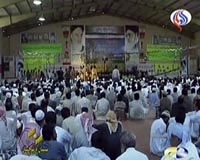| . |  |
. |
Vienna (AFP) Oct 21, 2009 The UN's atomic watchdog on Wednesday handed Iran and world powers a draft deal for approval by the end of the week that could dramatically ease tensions over the Islamic republic's controversial nuclear programme. The agreement was brokered after crunch talks between Iran, Russia, the United States and France, and has been sent to the capitals for final approval, said Mohamed ElBaradei, the head of the International Atomic Energy Agency (IAEA). ElBaradei declined to reveal any details about the draft document, but diplomats said it included demands that Iran ship out most of its stockpile of low-enriched uranium for further processing by another country. The US, Russia and France had insisted on the point, because it would allay fears that the uranium -- which Iran's hardline rulers have produced in defiance of the United Nations -- could be used to build an atomic bomb. "I have circulated a draft agreement that reflects in my judgment a balanced approach on how to move forward," ElBaradei told reporters. "The deadline for parties to give, I hope, affirmative action is Friday." "I would cross my fingers that by Friday we should have an OK and an approval by all the parties concerned." Washington welcomed the deal, saying it hoped it could be finalised in the next few days, so as to lower tensions with Tehran. "I think would be an important step for the Iranians to show the international community their intentions," White House spokesman Robert Gibbs said. Later, State Department spokesman Ian Kelly paid tribute to "ElBaradei's skillful efforts and dedication to pursue this initiative of getting Iran to send out their low-enriched uranium to third countries," and hailed the draft agreement as a "very positive step." Top French nuclear negotiator Jacques Audibert said Paris supported the draft. Russia, France and the US have all been pushing Iran to move forward an agreement -- reached in principle in Geneva on October 1 -- under which Tehran would ship 1,200 kilogrammes of its own stockpiled uranium to Russia, and subsequently France, by the end of the year. But ElBaradei did not reveal whether Iran had finally agreed to that key point after three days of talks in Vienna. Tehran had previously made it clear that it did not want France to be part of any deal. Asked whether his proposed agreement involved France, the IAEA replied: "My proposal has France included." For his part, the head of the Iranian delegation, IAEA ambassador Ali Asghar Soltanieh, said: "France had announced their readiness. But of course, as you've noticed, the Russians have been responsible for the whole contract." That appeared to suggest that, in a face-saving compromise, Russia would be responsible for further enriching the uranium to the 20-percent levels required by Iran. And it would sub-contract the additional processing to France, so that no direct negotiations between France and Iran would be required. Soltanieh was tight-lipped on exactly where the uranium would come from, be it from Tehran's own stocks or, as the Iranians had initially wanted, from foreign suppliers. He said only that Iran would be in an position to "get the fuel" for its research reactor which makes isotopes for medical uses such as cancer treatment. "We are masters of enrichment technology," Soltanieh said. "We could produce the fuel for ourselves for this nuclear reactor. But we have decided that we will receive the fuel from the potential suppliers willing to do so instead of that, under the auspices of the IAEA." The full details of the agreement would be revealed Friday, Soltanieh told reporters, describing the outcome of the talks this week as "very positive". Western powers suspect Iran has embarked on research to build a nuclear bomb. Iran has denied the claims, but has been accused by the IAEA of not cooperating with efforts to determine whether its atomic programme is peaceful. "We just concluded a meeting of two-and-a-half days, on (the) modalities and how to ensure that Iran will have the fuel required for its research reactor," ElBaradei said. "That research reactor is used for producing medical isotopes for diagnosis and treatment of cancer, so it's a purely humanitarian mission, objective." A key confidence building measure on Iran's part would that no enriched uranium be "manufactured into fuel," ElBaradei said. "That can defuse a crisis that has gone on for a number of years." ElBaradei called on everyone concerned to "see the big picture and see that this agreement could focus the way for a complete normalisation of relations between Iran and the international community. Share This Article With Planet Earth
Related Links Learn about nuclear weapons doctrine and defense at SpaceWar.com Learn about missile defense at SpaceWar.com All about missiles at SpaceWar.com Learn about the Superpowers of the 21st Century at SpaceWar.com
 Iran's enemy within strikes again
Iran's enemy within strikes againTehran (UPI) Oct 19, 2009 The weekend slaughter of several Revolutionary Guards generals in suicide bombings in the border province of Sistan-Baluchistan marked a sharp intensification of a slew of simmering insurgencies throughout Iran's restive frontier regions. Tehran has accused the United States, Britain and Pakistan of fomenting the violence. All have denied any involvement, but over the years all have had ... read more |
|
| The content herein, unless otherwise known to be public domain, are Copyright 1995-2009 - SpaceDaily. AFP and UPI Wire Stories are copyright Agence France-Presse and United Press International. ESA Portal Reports are copyright European Space Agency. All NASA sourced material is public domain. Additional copyrights may apply in whole or part to other bona fide parties. Advertising does not imply endorsement,agreement or approval of any opinions, statements or information provided by SpaceDaily on any Web page published or hosted by SpaceDaily. Privacy Statement |